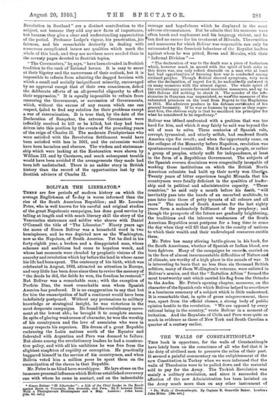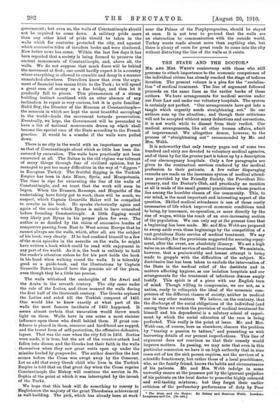THE WALLS OF CONSTANTINOPLE.*
THIS book is opportune, for the walls of Constantinople have lately been on the conscience of all who feel that it is the duty of civilised men to preserve the relics of their past. It seemed a painful commentary on the enlightenment of the new Constitution in Turkey when we were informed that the walls of Theodosius were to be pulled down and the material sold to pay for the Army. The Turkish Revolution was mainly a military revolution, and since it succeeded the affection of the new Administration has been lavished on the Army much more than on any other instrument of • The Walls of Constantinople. By Captain B. Granville Baker. London: John Milne. [16s. net.]
government; but even so, the walls of Constantinople should not be required to come down. A military pride more than any other kind of pride should be taken in the walls which for centuries protected the city, and against which successive tides of invaders broke and were shattered. Now better news has come. Within the last few days it has been reported that a society is being formed to preserve the ancient monuments of Constantinople, and, above all, the walls. We do not suppose that much force will be behind the movement at first ; one could hardly expect it in a country where everything is allowed to crumble and decay in a manner unmatched elsewhere. Travellers know that even the argu- ment of financial loss means little to the Turk ; he will spend a great sum of money on a fine bridge, and then let it gradually fall to pieces. This phenomenon of a strong building instinct combined with an utter absence of any inclination to repair is very curious, but it is quite familiar. Halid Bey, the Director of the Museum at 'Constantinople— the museum in which are kept the most beautiful sarcophagi in the world—leads the movement towards preservation. Eventually, we hope, the Government will be persuaded to have a list of national monuments drawn up which shall become the special care of the State according to the French practice. It would be a scandal if the walls were pulled down.
There is no city in the world with an importance as great . as that of Constantinople about which so little has been dis- covered by excavation. The walls have practically not been excavated at all. The Sultan in the old regime was tolerant of many things through fear of civilised opinion, but be managed to put too many difficulties in the way of " diggers " in European Turkey. The fruitful digging in the Turkish Empire has been in Asia Minor, Syria, and Mesopotamia. The time is ripe for excavating the line of the walls of Constantinople, and we trust that the work will soon be begun. When the Evanses, Ramsays, and Hog,arths of the undertaking have fairly got to work, there will be much, we suspect, which Captain Granville Baker will be compelled to rewrite in his book. He speaks rhetorically again and again of the oracle which Byzas is said to have consulted before founding Constantinople. A little digging would very likely put Byzas in his proper place for ever. The author is so dazzled by the vision of successive hordes of conquerors passing from East to West across Europe that he cannot always see the walls, which, after all, are the subject of his book, very clearly. If he had confined himself to a few of the main episodes in the assaults on the walls, he might have written a book which could be read with enjoyment in any part of the world. As it is, the book is unlikely to hold the reader's attention unless he for his part holds the book in his hand when walking round the walls. It is tolerably good as a guide-book, and the illustrations by Captain Granville Baker himself have the genuine air of the place, even though they be a little too precise.
The walls withstood the onslaughts of the Avari and the Arabs in the seventh century. The city came under the rule of the Latins, and these manned the walls during the first half of the thirteenth century. The Greeks replaced the Latins and ruled till the Turkish conquest of 1453. One would like to know exactly at what part of the walls the most famous incidents of 1453 happened. It seems almost certain that excavation would throw much light on them. Walls have in one sense a most sinister influence upon those who dwell behind them. If great con- fidence is placed in them, resource and hardihood are sapped, and the truest form of self-protection, the offensive-defensive, lapses. That was the case when the city fell in 14-53. Sorties were made, it is true, but the art of the counter-attack had fallen into disuse, and the Greeks lost their faith in the walls themselves when they saw great rents open up under the missiles hurled by gunpowder. The author describes the last scenes before the Cross was swept away by the Crescent. Let us add that every Greek child who lives in the Turkish Empire is told that on that great day when the Cross regains Constantinople the Bishop will continue the service in St. Sophia at the point at which it was interrupted by the inrush of the Turks.
We hope that this book will do something to convey to Englishmen the majesty of the great Theodosian achievement in wall-building. The pick, which has already been at work
near the Palace of the Porphyrogenitus, should be stayed at once. It is not true to pretend that the walls are an obstruction to communication with the outside world. Turkey wants roads almost more than anything else, but there is plenty of room for great roads to come into the city without disturbing the line of the walls as it exists.







































 Previous page
Previous page